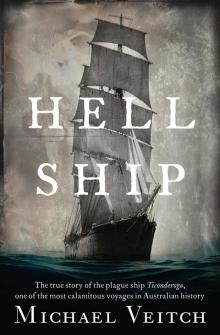- Home
- Michael Veitch
The Forgotten Islands
The Forgotten Islands Read online
MICHAEL VEITCH
THE FORGOTTEN ISLANDS
a personal adventure through the islands of Bass Strait
VIKING
an imprint of
PENGUIN BOOKS
Contents
THE STORY
1 FIRST ISLANDS
2 ‘THE CHEESE ONE, AND THE OTHER ONE’
3 STANLEY
4 CLIMBING THE NUT
5 THE BUSH PILOT
6 THE BIG DUNE
7 BEAR ISLAND
8 I AM NOT AN ANGLER
9 THE SEALERS
10 NETTLES
11 A PERFECT BEACH
12 FAREWELL, THREE HUMMOCK
13 THE NATURALIST
14 ALL AT SEA
15 PILLARS IN THE WATER
16 A GREEN WOODEN HUT
17 RON’S OTHER STORY
18 THE OLD AIRPORT
19 BACK IN THE AIR AGAIN
20 THE PHANTOM RANGER
21 LEEDHAM’S LIST
22 AN OLD BOOK IN A BIG LIBRARY
23 THE SHELL LADY
24 WYBALENNA
25 MARGE, THE DIAMOND DIVER
26 JOHN THE PILOT
27 JAMES THE MARINER
28 THE MUTTON-BIRD
29 THE KING OF THE ISLANDS
30 THE WORST OF SHIPWRECKS
31 THE CRUEL ROCKS
32 FINALLY, DEAL
33 SEEING THE LIGHT
34 A LONELY HILL
35 THE COVE
EPILOGUE
THE FORGOTTEN IS LANDS
Michael Veitch spent much of his youth writing and performing in television sketch comedy programs, before freelancing as a columnist and arts reviewer for newspapers and magazines. For four years he presented Sunday Arts, the national arts show on ABC television, and produced two books indulging his life-long interest in the aircraft of the Second World War, Flak and Fly. He lives in Hobart where he presents ABC radio.
ALSO BY MICHAEL VEITCH
FLAK
FLY
THE STORY
This is how it was told to me when I was about twelve years old:
Far out into Bass Strait, a wild and treacherous stretch of water between the island of Tasmania and the mainland of Australia, there is a lonely place called Deal Island. Around the turn of the twentieth century, only a handful of people lived on this rocky and windswept outpost: the lighthouse keeper, his wife and a young assistant of about eighteen years of age. These hardy souls all lived here for one purpose: to ward passing vessels away from Deal Island’s perilous granite cliffs, which, before the light’s construction in 1848, had claimed ships and lives by the score. The young assistant’s job – and a privileged one it was – was to be trained in the complexities of keeping the light shining each and every night in all weathers. There was much to learn: the elaborate clockwork mechanism that kept the light turning, the mercury trough and ring on which the giant lantern revolved; caring for the multi-faceted glass lens, and the ongoing battle against wind and salt and rain which continuously battered this lonely place in the middle of the sea. It was a hard and isolated life, but a few months into his apprenticeship, the boy had found a pleasant distraction to the monotony of his daily routine. Each morning at dawn he would make his way down a steep path from the headland under the lighthouse to a small, sheltered cove he’d discovered where the water was deep but protected on three sides by the rocks. Here he began his day by dropping a fishing line off the end of a granite outcrop and collecting a couple of snapper or salmon, which he’d take back up the path to his modest cottage and cook up for his breakfast, supplementing his often meagre rations …
I should probably mention here that this story was told to me by a very old friend of my father’s called Ron. Ron and Dad went way back. During the war they’d been journalists together on some of the big city newspapers, and judging by the way they went on about it, those must indeed have been the glory days of the old-fashioned ‘newspaper men’ such as they. With most of the older hands away either fighting the Japs or writing about doing so, young upstarts like Ron and my father ascended to positions unthinkable in normal times. Hence, Dad, at just sixteen, ran the Newcastle office of a major Sydney daily, and Ron – tall and charming – probably did whatever he liked.
Both of them would often repeat the same small number of stories, but I never let on I’d already heard them because Ron, to me, was a source of utter fascination. Charismatic and intelligent, he cast his spell over almost everyone, and as a curious twelve year old, I was a particularly devoted acolyte. Ron ignited in me a hunger for knowledge that remained insatiable for years, one my parents, sadly, were never able to satisfy. Ron took a shine to me too, impressed perhaps by my precocious interest in matters beyond my years. He knew about all sorts of things in which my father had little interest: music, history, the way rocks formed under the ground, the wonders of the cosmos, and the current state of play in the Middle East.
He had a large collection of old books and would frequently pick out a volume to show me, such as one of his favourites – I can still picture its smooth, dark-brown cover – The Martyrdom of Man by Winwood Reade. Like Ron, this once famous nineteenth-century atheist despised religion and was an avowed socialist. Clutching the slim, worn volume like a weapon, Ron would launch into mesmerising diatribes against religion, government and conservatism, using an intoxicating cocktail of humour and invective like a character in a play. It was dazzling.
Ron taught me words like ‘recapitulation’, ‘verisimilitude’ and ‘lignite’ and gave me stories about Beethoven and his symphonies, such as how, just after dedicating the newly completed third symphony, the Eroica, to Napoleon, the composer became fiercely disillusioned with the dictator’s growing megalomania, and in a rage tore off the title page and threw the entire score into the fireplace, from which it was rescued only in the nick of time by a quick-thinking servant.
On the veranda one clear night, Ron pointed up to Orion and tried to make me comprehend the size of the distant giant Betelgeuse by declaring that if the centre of this mighty sun was in the exact same position as that of our own, we here on Earth would be engulfed barely halfway inside its interior. Even now my brain collapses a little at the thought of it. Ron told me all sorts of things like that. Things I still think about nearly forty years later.
What I didn’t know, however, was that Ron was actually a monster.
This man I admired so much was, in fact, cruel, lying, manipulative, anti-Semitic, deeply misogynist, and as is often the way with genuine egomaniacs, utterly amoral. Ron cheated on everyone: his wife, his business partners, his lovers, even his children. When at last it all caught up with him, his entire world collapsed. He attempted to drag as many as he could down into his self-made mire, so my mother (always a better judge of character than Dad) severed all contact with him. For decades, he vanished from our lives until, after learning of my mother’s death, he slipped quietly back into my father’s world, and, as Dad began a long slow descent into dementia, tried to cheat him out of his life savings.
Yet despite all this, despite four intervening decades and having long ago peered into the overflowing crypt of his faults, I can, if I try, still feel the raw feverish excitement of standing, as a young and curious boy, at the wondrous threshold of knowledge.
… eventually, it had become so that the lighthouse keeper could almost time his watch by the reappearance of the young man at the top of the path clutching his morning catch of silvery, wriggling fish. Here, the two men, young and old, master and apprentice, would discuss the previous night, and plan the day that lay before them. This little parley had become part of a civilising routine in their remote spot in the middle of the ocean, where every aspect of
their existence was underscored by the catastrophic spectre of ships smashing into the rocks below. The two men became friends. Then, one morning, the boy didn’t come back …
My parents and I would spend almost every Christmas with Ron and his wife, June, at their rather spectacular seaside holiday home with its large pool and panoramic views of the bay from the balcony and sunroom. Although claiming to be on the political left, Ron had always managed to secure the finer things in life, and often told stories of how clever he had been in acquiring them. How, for instance, some time in the late fifties, he had wandered onto this very block before it was even for sale, climbed one of the sturdier tea-trees and realised that a two-story elevation here would give an uninterrupted view of the sea. My parents had never had anything like a beach house. We probably could have managed one, but the thought of doing so simply never entered their heads. So year after year, Ron and June’s became a kind of proxy home by the sea. Actually, that’s not entirely true. On Ron’s urging, Mum and Dad once got it together to snap up a small block a few miles away – also with ocean views – but quietly sold it again for little more than what they paid for it, a few years down the track.
… with growing anxiety, the lighthouse keeper stood at the top of the path that led down to the water, waiting under the enormous white light tower for the boy to return. Eventually, and with great reluctance, he made his own way down, picking out the path towards the rocks, calling the young man’s name as he descended. It was sunny and the sea was calm. Ironically for a man in his position, he hated being too close to the water and the thought occurred to him that he had no idea exactly where it was he was headed, having never joined the boy on any of his morning expeditions. Reaching the bottom, however, he was presented with a sight that at once told him everything and nothing. In front of him, folded neatly on a slab of granite overlooking the gently heaving pool of dark water, he recognised the young man’s jacket. Next to it sat a small tin of fishing equipment and a half-eaten biscuit. He looked around. He could see no other way out of the place except by that which he had just come. No wave had risen up to wash anything into the sea, no one floating face-down in the water. He called the boy’s name again, but all he heard was the gentle sucking of the deep dark water on the rocks …
Christmases at the beach house were a slow-motion train wreck played out over a stultifying three weeks of summer. Scorching January days spent in the company of four dysfunctional adults, cooped up in their strange and enervating palace by the sea. It seemed that as soon as we arrived, a small tap in the reservoir of our energy was quietly opened and left to drain away. My memories are vivid, but patchy, like a disturbing film remembered only in parts: long afternoons punctuated by sudden, savage arguments; brittle silences over burnt evening meals; boredom alleviated by gigantic and impossible jigsaw puzzles; and a suffocating cigarette haze shattered by sudden moments of hysteria. I was always the solitary child. My siblings, all older, retained the sense or strength of character not to be cajoled into joining us. My mother spent the entire time, cigarette in hand, silently obsessing over the puzzles or becoming inebriated with June – the primary foundation of their friendship. I can even today hear the peals of drunken laughter ringing out from somewhere deep in the house, and shudder slightly still.
Christmas Day was particularly gruesome. By mid-morning, the smell of burnt food began to creep, room by room, through the house. By this time my mother was usually plastered and a huge row would erupt between Ron and June, on schedule, about 11 am. This was always his cue to storm out and leave. It was the same every year. He would usually return late the next day as if nothing had happened. Nothing was said.
Mum at least had her drinking buddy, but Dad oscillated between relentless boredom and exasperated attempts to coax Ron into letting us use the only thing that held any interest for him, his boat. It was nothing special, just a little fibreglass runabout that lived on a trailer at the bottom of the large, lush garden. Other than as a means to humiliate my father by continually denying his requests to use it, Ron seemed to have little interest in the thing. Occasionally Dad and I would manage to persuade him to take us out in it himself, but for never anything more than a cursory run just off the beach. Like a kid, Dad would hanker for a go at the wheel, an honour Ron rarely granted. Why my father put up with this treatment I’ll never know. Like me, he too was probably in awe of him, and, looking back, I suspect he hated himself for it.
Sometimes though, while out on the boat, Ron would turn to me, and load me up with facts such as that Port Phillip Bay was one of the largest true bays in the world, almost totally landlocked except for a narrow opening to the sea known as The Rip; how the turn of the tide could be so sudden that it would arrive in the form of a wave which could be ridden by surfers; how the water takes a full two years to circulate, always in a clockwise motion; how, over the aeons of successive ice ages, it has drained and filled up time and again like a giant sink; and how samples taken of its bottom reveal a geological sandwich of sand and coal or, as he liked to call it, lignite.
But the best stories by far were the ones he told me about what lay outside the entrance to the bay, about the treacherous and unpredictable passage of water called Bass Strait, and its cold, mysterious, ghost-filled islands.
… the lighthouse keeper searched what he could of the island, but found no trace of the boy. Eventually, he gave up and was forced to wait till the supply ship arrived a few weeks later. To the captain, he reported the solemn news of his missing man. More time elapsed before a constable was sent from Tasmania to investigate. This policeman spent several days on Deal Island, subtly attempting to deduce anything unusual about the keeper’s story. He inspected the little grotto where the young man had disappeared, then closely interrogated the keeper and his wife, trying to glean something, anything they may be hiding. A murder plot, perhaps, or love triangle? Nothing untoward was discovered, however, and, eventually, he prepared to submit an open finding …
I can never forget that final summer with Ron. I somehow sensed this would be our last, but couldn’t say why. It started with the usual greetings and jokes and beers by the pool, but soon an even more poisonous atmosphere than usual descended, and stayed. As a virtual only child, my early adolescent sensitivity to clandestine adult dramas was always highly tuned, but this time there was no need to read between the lines. Over the next couple of days, the peculiar system that dictated our existence here seemed to break down. Muffled shouts and tears behind closed doors could be heard as I rambled through the garden, and a daily excursion with my father to somewhere – anywhere – to get us away from the place, would normally be well underway by lunchtime. ‘Let’s ah … go out for a bit,’ he’d say, as he’d come and find me, leaving the mad people to burn up in their strange stifling indoor world. I don’t think I ever felt as close to my father as those times he found the sense to come and take me away from all that, even if it was just to buy an ice-cream or look at things at the hardware shop.
But it was my mother who, in one of her unexpected gestures of candour, let me know what was really going on. ‘He’s been having an affair,’ she told me blandly late one night in the downstairs billiard room. This in itself was not news. Ron’s infidelities were legendary. Even Dad had told me of his eventual despair as a younger man, at having to continually cover for the damage wrought by Ron’s relentless womanising, playing his part in a tawdry script of false alibis to a litany of angry and bewildered females (and my father was no angel himself). June, we all assumed, had long proffered a blind eye to it all, happy to enjoy the accoutrements as the wife of a successful, if unscrupulous, businessman, flitting seamlessly between townhouse and beach house.
But this time something was different. ‘He has a woman in Hobart,’ my mother said in the dim light of that downstairs room. An airline hostess, apparently. He’d met her on a flight and had been in a relationship for some time. With macabre jocularity, my mother, out of June’s earshot, had joked about Ron�
�s spontaneous ‘business trips’ to Tasmania. Hence the sudden departures on Christmas morning, perfectly timed to make the lunchtime flight to Hobart, booked weeks in advance. ‘This time he’s going to leave her,’ said Mum in a rumbling whisper, looking straight ahead and inhaling a cigarette. ‘And there’s more. He’s had a child.’ Even she hadn’t known about that one. I could see it annoyed her.
On the morning the police constable was preparing to leave Deal Island, having drawn a blank in his investigations and accepted the mystery of the missing boy would never be solved, he decided, for no particular reason, to make a final trip down the steep, rocky path to the little inlet from where he had vanished several weeks before. It was a similar morning: good weather and a calm sea. He stood on the rock where the boy had sat and fished all those many mornings and contemplated the gentle swell of the dark heaving water a few feet below. In his stomach, he felt the sourness of a case unsolved.
Then, beneath the surface, he noticed movement. Apale flash of… something. Instinctively, he took a step back. As he did, the surface of the water just under the rock on which he was standing broke, and a long, multi-suckered tentacle rose up and swept the rock one way, then the other, as if feeling for something. Then, it slithered back and disappeared again beneath the surface …
I can still picture myself, as a twelve year old, being told this dark story by that dark man amid that swirling ocean of chaos. It was late one evening, and I was in the billiard room, where I liked to spend time lining up the balls on the big full-sized table and bouncing them off the green baize cushions with my hands, as I was not yet considered mature enough to hold a cue. Ron appeared from upstairs clutching a rolled-up sheet. ‘Aha …’ he said, pretending to have stumbled upon me, although I knew that at emotionally charged times such as these, he would often seek me out as a kind of oasis, a like mind with whom he could retreat once more into the neutral and reliable realm of facts.

 Turning Point
Turning Point Heroes of the Skies
Heroes of the Skies The Forgotten Islands
The Forgotten Islands Hell Ship
Hell Ship Flak
Flak Fly
Fly